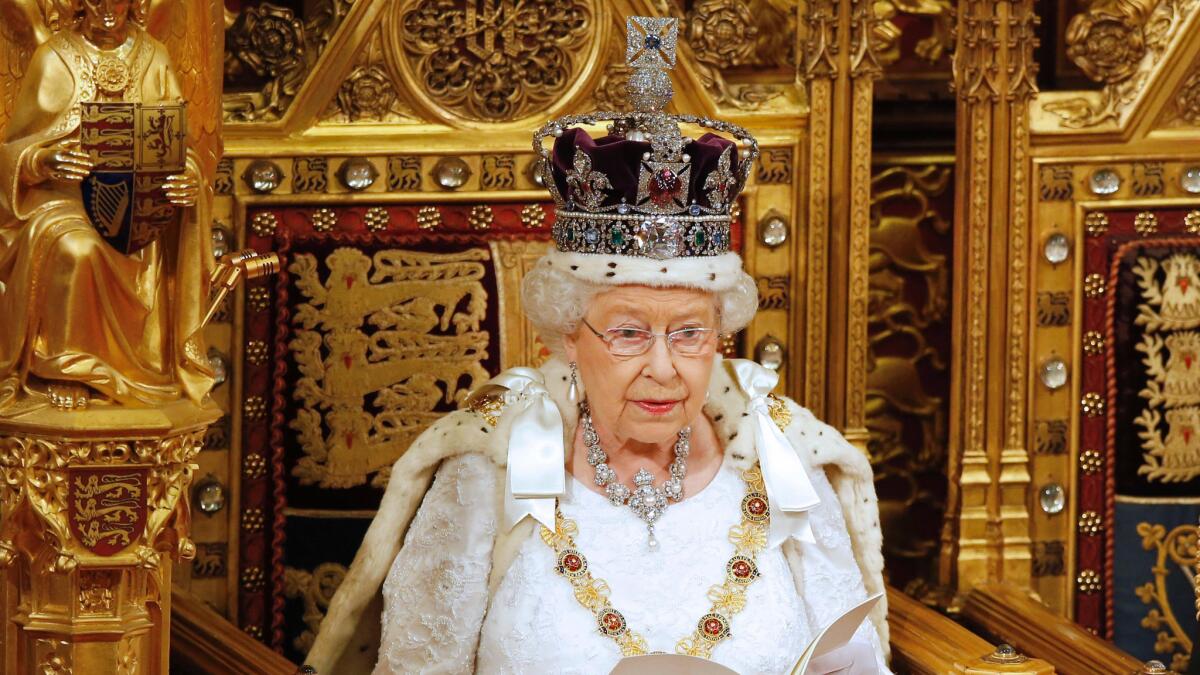Britain’s prime minister and queen prioritize tackling extremism and reforming prisons

- Share via
Reporting from London — British Prime Minister David Cameron laid out plans to tackle the “menace” of extremism Wednesday during a day of lavish pomp and ceremony that marks the annual State Opening of Parliament.
Measures to clamp down on hate speech and to protect young people from exposure to radical ideology formed a crucial part of the Queen’s Speech on the day when the monarch outlines the government’s legislative plans for the coming year.
“Extremists – both violent and nonviolent – are trying to drive our country apart,” Cameron said in his written introduction to Queen Elizabeth II’s address, which was delivered in parliament.
The threat of a Paris- or Brussels-style attack continues to hang over Britain and the government hopes the Counter-Extremism and Safeguarding Bill will give it greater armor to tackle head-on the ongoing problem of homegrown extremism.
If it becomes law, authorities would have new powers to restrict extremist activity and intervene in unregulated schools that “teach hate and drive communities apart.”
The bill would give the government greater power to disrupt the activities of people identified as extremists by stopping them from speaking or attending public events or protests, or promoting their messages online, or from working with children.
The government would also have power to intervene in councils that have failed to tackle extremism, and loopholes would be closed so that Ofcom, the broadcast regulator, could stop live-streaming extremist material from abroad.
The proposals were met with mixed reactions from civil liberty campaigners and think tanks.
“Investing in effective counter-messaging and opposition groups to extremism is far more effective than banning,” the counter-extremist think tank the Quilliam Foundation said in a statement. “Extremist views are legal in liberal western society. Banning them sets an unnerving precedent.”
Later, in the House of Commons, Cameron called for cross-party support for his bill and said going after the most extreme, most violent individuals was not sufficient -- Britain had to target all forms of radical views.
“It’s no good saying let’s just focus on the violent extremists, everyone else is just exercising their freedom of speech,” the prime minister said. “That’s not good enough in our liberal democracy.”
The Queen’s Speech is the centerpiece of the State Opening of Parliament, a ceremony steeped in lavish pomp and tradition.
The monarch and her husband, Prince Philip, traveled to parliament in her horse-drawn Diamond Jubilee State Coach. She was dressed in white and wore a diamond-encrusted crown.
This was her 63rd Queen’s Speech and the only key difference to proceedings this year was that the monarch, who just turned 90, opted to take the elevator once inside parliament, instead of using the stairs.
The anti-extremism measures were introduced as part of 21 new bills. Despite the historical significance of the day, they were all designed to create a modern Britain that is progressive and at the forefront of technology.
They were also intended to secure Cameron’s legacy as a social reformer.
The centerpiece of the Queen’s Speech was a comprehensive prison reform plan designed to bring the criminal justice system out of “Victorian times.”
“My government will legislate to reform prisons and courts to give individuals a second chance,” the Queen said.
Some inmates fitted with GPS tracking devices may be allowed to leave the prison during the week to work or further their education.
Cameron said the measures showed “bold reform from a progressive one-nation government.”
They will also help to tackle another pressing issue: the fact that many European prisons have become a breeding ground for Islamic extremism, including some of the perpetrators of the Paris and Brussels attacks.
The measures include plans for a sugar tax, support for spaceplanes and commercial spaceports, driverless cars and the legal right to fast broadband connections for every household.
Although the nine-minute Queen’s Speech made only fleeting reference to the European Union referendum, the Conservative Party’s in-fighting over the June 23 in-out referendum cast an undeniable pall over proceedings.
Former work and pension secretary Iain Duncan Smith, a key member of the Leave campaign, accused Cameron of watering down contentious elements of the legislative plan to avoid any added upset or controversy.
It was part of the government’s “helter skelter pursuit of the referendum,” he said.
Boyle is a special correspondent.
More to Read
Sign up for Essential California
The most important California stories and recommendations in your inbox every morning.
You may occasionally receive promotional content from the Los Angeles Times.










